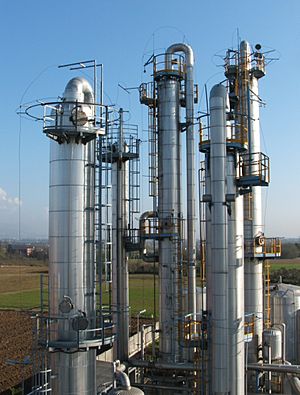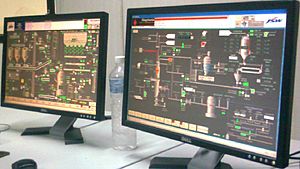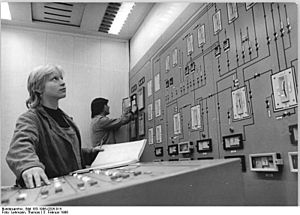Chemical engineering facts for kids

Chemical engineering is a cool part of engineering that uses science and math to create, change, move, and use chemicals, materials, and energy. Chemical engineers design big systems that turn raw materials, living cells, tiny organisms, and energy into useful products. Think about how your medicine is made, or the plastic in your toys!
Contents
What's New in Chemical Engineering?
Chemical engineering is always growing!
- Computers help a lot: Nowadays, computers are super important. They help engineers design and manage factories. This makes calculations and drawings much easier than doing them by hand.
- Understanding life: Big projects like the Human Genome Project have also changed chemical engineering. This project helped scientists understand our DNA. Chemical engineers used their skills to make large amounts of DNA sequences for research. This helps with things like genetic engineering.
Key Ideas in Chemical Engineering
Chemical engineers use several important ideas to do their work. Here are some of the main ones.
Chemical Reactions in Action
Chemical engineers make sure that factories run smoothly and efficiently. They study how chemicals react and design special containers called reactors. They use lab data and scientific rules, like chemical thermodynamics, to predict how these reactors will work. This helps them solve problems and make sure the factory produces what it needs to.
How Things Move Around
Imagine how liquids, heat, and different substances move. This is called "transport phenomena." It's super important in factories. Chemical engineers study:
- Fluid dynamics: How liquids and gases flow.
- Heat transfer: How heat moves from one place to another.
- Mass transfer: How different substances mix or separate.
Understanding these movements helps engineers design better systems. They use math to create models that show what happens at different levels, from tiny molecules to large factory parts.
What Do Chemical Engineers Do?
Chemical engineers find smart and affordable ways to use materials and energy. They use their knowledge of chemistry and engineering to change raw materials into useful products. These products include medicines, fuels like gasoline, and plastics. They work in large factories and also help with waste management and research. Computers are a big part of their daily work.
Chemical engineers might work in factories or at universities. They design and do experiments to find safer and better ways to make products. They also work on controlling pollution and saving natural resources.
Some chemical engineers are called "project engineers." They help design and build factories. They choose the best ways to make products and pick the right equipment. Their goal is to keep costs low, make sure everyone is safe, and help the company make money. After a factory is built, chemical engineers might help upgrade equipment, change processes, fix problems, and manage daily operations.
Other Cool Areas Chemical Engineers Explore
Chemical engineering is a very broad field today. It includes many exciting areas like:
- Biotechnology: Using living things to make products, like medicines or new foods.
- Nanotechnology: Working with super tiny materials, even smaller than a speck of dust.
- Mineral processing: Turning raw minerals from the Earth into useful materials.
Some newer topics that chemical engineers are working on include:
- Environmental safety: Making sure factories don't harm nature and keep our planet clean.
- New energy sources: Finding ways to create energy that don't rely on gas or oil, like solar or wind power.
- Biomedical engineering: Designing and building things for health and medicine, like artificial organs or medical devices.
Images for kids
-
This is a model of a direct-methanol fuel cell. The actual fuel cell is the layered cube shape in the middle.
See also
 In Spanish: Ingeniería química para niños
In Spanish: Ingeniería química para niños





